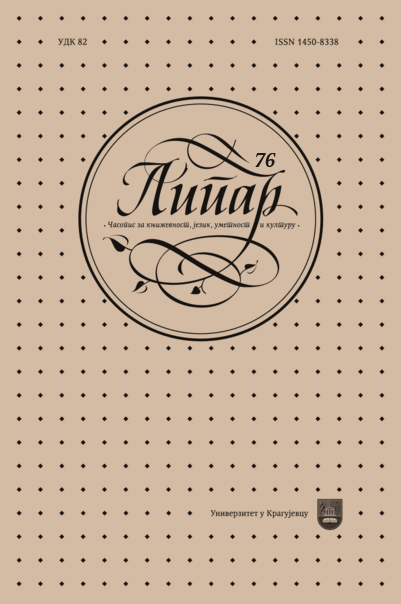ГОРАН СКРОБОЊА И ДЕН СИМОНС: ЧАС ИМАГОЛОГИЈЕ
GORAN SKROBONJA AND DAN SIMMONS: AN IMAGOLOGY LESSON
Author(s): Miloš D. MihailovićSubject(s): Language and Literature Studies, Studies of Literature, Comparative Study of Literature, Serbian Literature, Theory of Literature, American Literature
Published by: Универзитет у Крагујевцу
Keywords: speculative fiction;novum;imagology;right-wing;intertextuality
Summary/Abstract: The aim of this paper is to examine the relationship between Goran Skrobonja and Dаn Simmons’ works, as well as the way Anglo-American speculative fiction influenced Skrobonja. In order to do that, I compared two fiction works by these authors: Simmons’ novella Flashback from his colection Lovedeath (translated to Serbian by Skrobonja) and Skrobonja’s Tihi gradovi / Quiet Cities, one of the most renowned works of contemporary speculative fiction in Serbian literature. Suvin’s theory of science fiction and his term novum were used in order to draw parallels between these stories. In my analysis I have concluded that not only Skrobonja and Simmons use the same novum, but their stories also share a number of similari- ties, which suggest an intertextual relationship. Then, I conducted an imagological comparative analysis. First of all, I analysed the right-wing discourse which heavily influenced Simmon’s novella and foreshadowed author’s subsequent engagement in politics, thus ending his amiable correspondence with Skrobonja. Bearing that in mind, Tihi gradovi can be read as a negation of Flashback and Simmons’ poetics, as well as his right-wing world view. As a results, Tihi gradovi differ from the rest of Skrobonja’s work, primarily by defying the poetics of Anglo-American specula- tive fiction, which have heavily influenced Skrobonja for the most of his career. In this story, he has showed that his relationship towards his literary forefathers is not epigonal, but much more nuanced and sceptical. Thus, the wide recognition Tihi gradovi attained in contemporary literary criticism is recognized as justified, as this story is truly one of Skrobonja’s finest achievements.
Journal: Липар - часопис за књижевност, језик, уметност и културу
- Issue Year: XXII/2021
- Issue No: 76
- Page Range: 217-228
- Page Count: 12
- Language: Serbian

